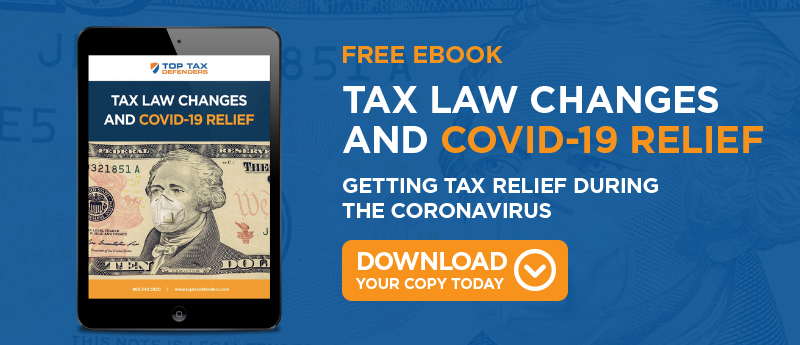
The COVID-19 pandemic has pretty much turned the world upside down. In a surprising but welcome move, the IRS has moved Tax Day to July 15, 2020. But that isn’t the only difference COVID-19 makes to your 2020 taxes and tax activity.
Besides dealing with filing and paying taxes (or receiving refunds) for the 2019 tax season, many individuals are likely to see a drastic change in their income and withholdings for 2020.
The Coronavirus Aid, Relief, and Economic Security (CARES) Act created new tax rules and provided stimulus money and expanded unemployment insurance. Let's look at what COVID-19 might mean for your 2020 taxes.
What Is the CARES Act?
The long, drawn-out title of the CARES Act pretty much spells out what it’s all about. Getting into the details:
- The creation of a tax credit provided in advance in the form of a stimulus check.
- The expansion of unemployment insurance with many recipients getting an additional $600 per week and more time.
- Non-filers and Social Security recipients receive stimulus money as well.
The stimulus check amounts to $1,200 per adult and $500 per qualified child under the age of 17. The amount decreases by $5 for each $100 over $75,000 earned for a single filer or over $150,000 for a joint filer. That’s in adjusted gross income.
Unfortunately, children over the age of 17 who can be claimed as a dependent are left out. You will not receive additional funds for them.
Besides additional weekly funds, unemployment may be stretched for more weeks than a particular state typically provides the insurance.
Stimulus Check FYI
Your stimulus check is yours to do with as you wish. You can spend it, save it, or invest it.
Of course, the federal government hopes you spend it to help get the economy back on its feet, but it isn’t required.
It may turn out that you receive excess funds when your 2020 income is taken into consideration, but you won’t need to pay any extra back to the government. The check is based on your 2018 or 2019 income level.
If you didn't file for 2019 yet, it is based on your 2018 tax return. Filing early for 2019 may have paid off if you had a child born in 2019 that you have yet to claim. By submitting your 2019 taxes, you could get another $500.
You will not owe taxes, state or federal, on the stimulus money you receive because it isn’t income. It is a tax credit like the child tax credit or earned income credit. The Treasury Department is merely paying it ahead of time. Also, it won't offset or reduce your normal deductions or credits for next year.
You don’t need to pay it back. It won’t be taken to pay for student loan debt or back taxes. However, it will be garnished if you are in arrears on child support payments.
If you experience a pay cut, cut in hours, or loss of job in 2020, you may receive an additional tax credit on your 2020 taxes.
Unemployment
The pandemic caused a massive economic shutdown of many businesses, requiring employees to be laid off or furloughed. More people are filing for unemployment than ever before, many for the first time. The employment categories allowed to file were increased. For the first time, freelancers and contractors were allowed to file as well.
If you were hired and the company was unable to get you started, you are still eligible for unemployment.
The CARES Act supplemented unemployment insurance to the tune of $600 more per week. Some coverage may be retroactive depending on when your state entered into an agreement with the IRS. Provisions for receiving unemployment insurance to stay home with a child were included in the Act.
Some individuals are handled case by case because their situation doesn’t fit into a handy unemployment scenario. For example, some folks were caught out on vacation when the pandemic was declared. Unable to return home, they’re wondering if they can file for unemployment insurance.
Another situation where the federal and state government must determine what to do it if you have a medical condition that could make COVID-19 worse. Most states are encouraging employers to make accommodations, and if they can’t, the employee can file for unemployment.
Workers who received a pay cut from their employer might be able to apply for partial unemployment if the pay cut was related to the COVID-19 pandemic.
Be aware that, as of this writing, quitting your job to collect unemployment is considered fraud unless you were exposed to COVID-19. If you are receiving full pay because your employer received funding from the Paycheck Protection Program, you are not eligible for unemployment insurance.
For people who are essential workers but who may be required to stay home with children, they can apply for Pandemic Unemployment Assistance (PUA) from the state.
The last thing to try if you need money now is to withdraw from your 401(k). Not only will you reduce the amount available when you retire, but you will also pay taxes and a penalty for early withdrawal. Don't raid your retirement unless you have no other choice.
The Paycheck Protection Program
Another segment of the CARES Act provides a program to help small businesses pay their employees while their business is closed due to the pandemic. It is considered a loan, however, if the employer uses at least 75% of the amount received to pay personnel and the rest is spent on work-related costs such as mortgage, rent or utilities, the loan is forgiven.
The first round of funding for the PPP was used up shortly after the program was started. The federal government is in the process of passing legislation to provide more financial support.
If you cannot meet the 75% payroll requirement, your small business can still apply for and receive a loan. You need to pay it back within two years at 1% interest.
Be On the Lookout for Scams
The IRS wants everyone to know that the agency does not ask for money back. It does not communicate through phone calls, text, or email. Do not provide personal or bank information to anyone claiming to be with the IRS, even if they claim they have funds to place in your account.
The COVID-19 pandemic drags on. You may or may not receive more aid from the government. As the economy opens back up, more illnesses may be on the way. Stay strong and follow safety guidelines. Contact Top Tax Defenders with any tax questions. We’re here to help.



